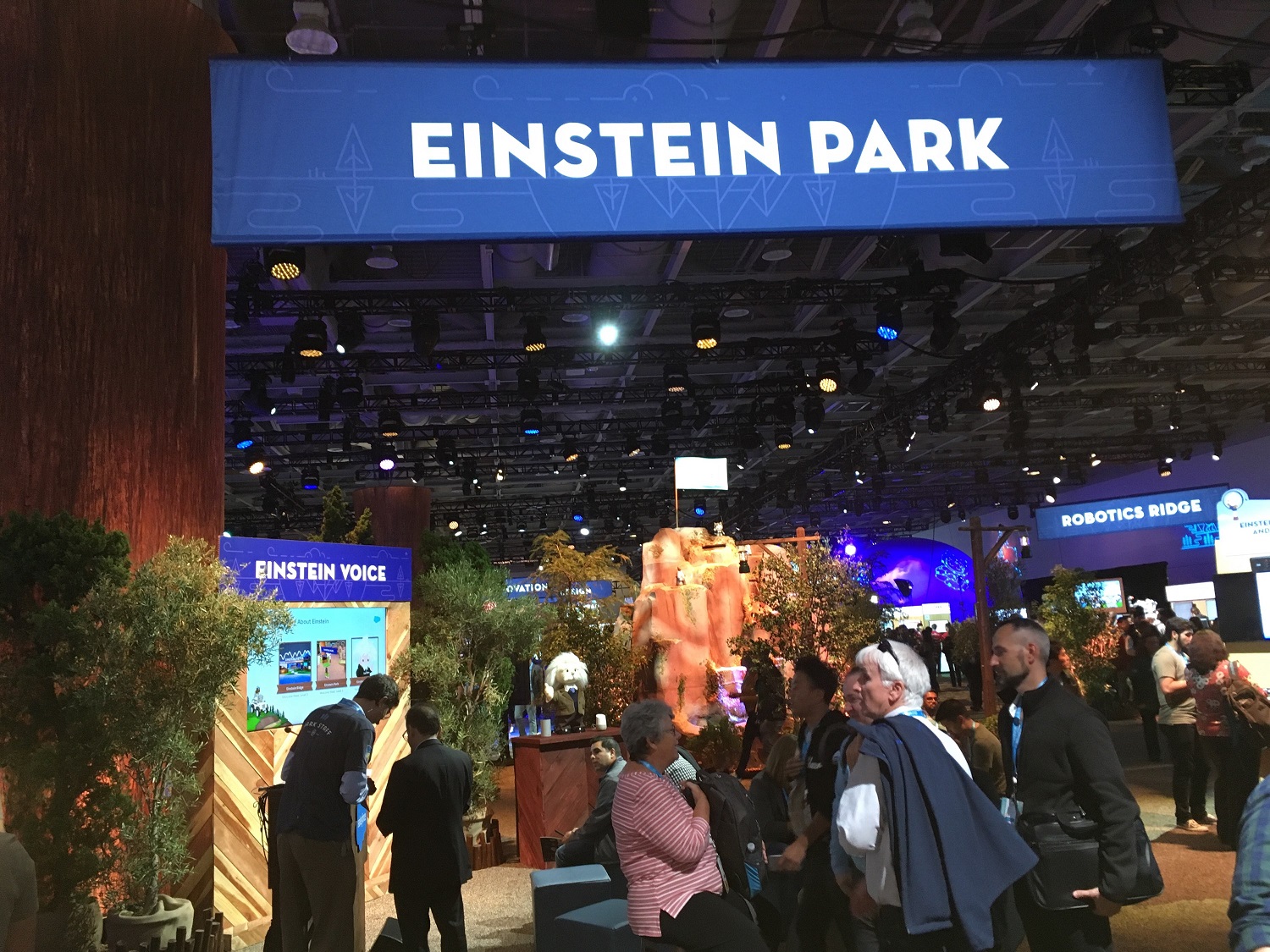 EMERGING TECH
EMERGING TECH
 EMERGING TECH
EMERGING TECH
 EMERGING TECH
EMERGING TECH
The driver in a car accident takes a picture of the damaged vehicle and sends it to an insurer for a coverage quote on the spot. A hat retailer uses data analytics to tweak its marketing formula and more than 60 percent of recipients suddenly open their messages in an email campaign. A hotel guest checks in and issues voice commands to an in-room personal assistant, ordering a rental car from the guest’s preferred company that shows up outside the lobby a half-hour later.
Is this the future of artificial intelligence, or is it a mad vision of computers run amok? In fact, these are all actual use cases presented during Dreamforce 2018 in San Francisco this week (pictured), and they underscore a theme that occupied much of the conversation among 170,000 attendees. Conference organizer Salesforce has been working hard on artificial intelligence since it rolled out Einstein two years ago and it may be making significant progress in a challenging and often overhyped field.
The stakes for Salesforce and every other company seeking to build a viable business in the AI space are high. It takes a significant capital investment to do it right, yet customers demand it.
“What’s coming next is AI,” Ulrich Spiesshofer, president and chief executive of global industrial solutions giant ABB Ltd., said during a conversation on Wednesday with Salesforce co-CEO Marc Benioff on a Dreamforce stage. “We need to be leading in AI use as an industry.”
ABB, which announced a significant in-house expansion of Salesforce’s Einstein AI technology this week, has built its business largely on the capabilities of intelligent industrial robots. The company created its own viral marketing stir last year when it had one of its robots conduct an orchestra in Pisa, Italy, while accompanied by the famed tenor Andrea Bocelli.
“We’re using AI combined with unique hardware to create a completely unique market,” Spiesshofer told Benioff.
AI use cases extend far beyond the entertainment value of robots conducting a Verdi opera before a rapturous Italian crowd. Auction Nation, a South African car auction company, depends on AI to sell salvaged vehicles sourced from top insurers. Using pictures taken of the damaged cars, Auction Nation employs Einstein Vision and Einstein Discovery to build an instant 3-D model and compare the result with previously sold cars for analysis of who might buy them.
“This model isn’t perfect yet,” said Errol Levin, chief operating officer at Auction Nation, during a Dreamforce presentation on Wednesday morning. “But it’s like a baby’s brain. The model is becoming more and more intelligent.”
Shortly before Dreamforce two years ago, Salesforce acquired MetaMind, a Silicon Valley-based AI startup. MetaMind’s CEO was Richard Socher, who as a Stanford doctoral student had conducted extensive research in deep learning, computer vision and natural language processing or NLP.
Socher is currently chief scientist at Salesforce and on Wednesday afternoon he offered conference attendees a peek behind the curtain at what the future of AI may hold as his company continues to pursue a number of research initiatives.
In the area of computer vision, Socher displayed a set of pictures including one with a little girl sitting on a bench and holding an umbrella. The computer could successfully identify girl, bench and umbrella when asked. In another example, the stripes on a cat’s tail were correctly called out. “We’re seeing more of these visual capabilities actually making it into production,” Socher said.
But the primary focus of the Salesforce research team is on NLP, not surprising given Socher’s previous academic work. He has published a lengthy body of research in the field.
One member of Socher’s research team is Bryan McCann, who joined Salesforce around the time of the MetaMind acquisition. McCann also studied at Stanford and was a course assistant for Andrew Ng, a specialist in AI and the previous founder of Google Brain.
On Wednesday, McCann presented the results of NLP work which revealed significant progress in the ability of computers to understand language context. The focus of the Salesforce team’s research was on successfully completing the “decaNLP,” a new benchmark that requires successfully performing 10 disparate natural language programming tasks.
According to McCann, the NLP solution developed by the Salesforce team can now do all 10 “fairly well” by creating a multitask language model. “We took 10 of the hardest tasks we could find in NLP,” McCann said. “And we used the natural language decathlon to guide our decisions.”
The results were intriguing. In a live onstage research demonstration, McCann showed the audience how the Salesforce model could ingest the convoluted text of a lengthy corporate press release and neatly summarize the content in fewer than 20 words. In another example, the model was told that no one in the audience had clapped during McCann’s presentation and was asked whether he was sad or happy. “Sad” came back as the computerized response.
“This model is able to do a lot of different things,” McCann said. “It’s how we can unify anything in NLP.”
How all of this will translate into business success for Salesforce remains to be seen, but the company shows no sign of taking its foot off the pedal of the AI car. A significant focus by the company at Dreamforce this week has been on its Einstein technology and Salesforce acquired yet another AI provider – Datorama – two months ago.
“We see a future that is conversational, contextual and intuitive,” Socher said. It’s also competitive. Salesforce delivered a clear message that it intends to be a major player.
THANK YOU